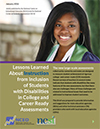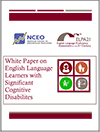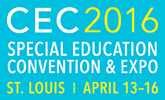Welcome
The year 2016 arrived quickly, and a lot already is happening. In this issue new products and activities are highlighted. New products include a Brief developed in collaboration with the National Center for Systemic Improvement (see Lessons Learned…) and a White Paper developed in collaboration with the English Language Proficiency Assessment for the 21st Century (ELPA21) consortium (see Alternate Assessment …). Two new Enhanced Assessment Grant (EAG) projects are summarized – DIAMOND and ALTELLA (check below for the meaning of those acronyms). Finally, this issue highlights some presentations and meetings at the upcoming conferences in April (CEC and AERA).
– Martha Thurlow, NCEO Director
Lessons Learned About Instruction from Inclusion of Students with Disabilities in College and Career Ready Assessments
 Recent surveys of teachers found that students with disabilities like many of the features of the new college- and career- ready (CCR) assessments that were recently rolled out by states and consortia, but that there are challenges related to instructional issues that need to be addressed to improve student outcomes. To address this issue NCEO and the National Center on Systemic Improvement recently co-published a Brief on Lessons Learned About Instruction from Inclusion of Students with Disabilities in College and Career Ready Assessments.
Recent surveys of teachers found that students with disabilities like many of the features of the new college- and career- ready (CCR) assessments that were recently rolled out by states and consortia, but that there are challenges related to instructional issues that need to be addressed to improve student outcomes. To address this issue NCEO and the National Center on Systemic Improvement recently co-published a Brief on Lessons Learned About Instruction from Inclusion of Students with Disabilities in College and Career Ready Assessments.
Data Informed Accessibility – Making Optimal Needs-based Decisions (DIAMOND)
![]() This year, NCEO is launching a new Enhanced Assessment Grant project titled “Data Informed Accessibility – Making Optimal Needs-based Decisions (DIAMOND).” The DIAMOND project is a collaboration between Minnesota, Alabama, Connecticut, Maryland, Michigan, Ohio, West Virginia, Wisconsin, Virgin Islands, and the National Center on Educational Outcomes.
This year, NCEO is launching a new Enhanced Assessment Grant project titled “Data Informed Accessibility – Making Optimal Needs-based Decisions (DIAMOND).” The DIAMOND project is a collaboration between Minnesota, Alabama, Connecticut, Maryland, Michigan, Ohio, West Virginia, Wisconsin, Virgin Islands, and the National Center on Educational Outcomes.
Alternate English Language Learning Assessment (ALTELLA)
![]() Most English learners with significant cognitive disabilities are not included in assessments of English language proficiency. As a result, there is little evidence of how these students are progressing toward English mastery to ensure their success in school and on the path to college, career, and community readiness. One new project underway at NCEO, the Alternate English Language Learning Assessment (ALTELLA) Project, aims to change this.
Most English learners with significant cognitive disabilities are not included in assessments of English language proficiency. As a result, there is little evidence of how these students are progressing toward English mastery to ensure their success in school and on the path to college, career, and community readiness. One new project underway at NCEO, the Alternate English Language Learning Assessment (ALTELLA) Project, aims to change this.
Alternate Assessment of English Language Proficiency (ELP) for Students with Significant Cognitive Disabilities
 NCEO developed a white paper to address approaches that states might take for an alternate assessment of English Language Proficiency (ELP) for students with significant cognitive disabilities. The development of this paper was accomplished through the work of NCEO staff with the English Language Proficiency Assessment for the 21st Century (ELPA21) consortium, which is developing an assessment of ELP.
NCEO developed a white paper to address approaches that states might take for an alternate assessment of English Language Proficiency (ELP) for students with significant cognitive disabilities. The development of this paper was accomplished through the work of NCEO staff with the English Language Proficiency Assessment for the 21st Century (ELPA21) consortium, which is developing an assessment of ELP.
NCEO Presentations at Upcoming 2016 Conferences
 If you plan to attend this year’s Council for Exceptional Children (CEC) annual convention (April 13-16) held in St. Louis or the American Educational Research Association (AERA) annual meeting (April 8-12) held in Philadelphia, we invite you to attend conference sessions delivered by NCEO staff members.
If you plan to attend this year’s Council for Exceptional Children (CEC) annual convention (April 13-16) held in St. Louis or the American Educational Research Association (AERA) annual meeting (April 8-12) held in Philadelphia, we invite you to attend conference sessions delivered by NCEO staff members.
NCEO’s National Assessment Center is supported through a Cooperative Agreement (#H326G110002) with the Research to Practice Division, Office of Special Education Programs, U.S. Department of Education. The Center is affiliated with the Institute on Community Integration at the College of Education and Human Development, University of Minnesota. The contents of this report were developed under the Cooperative Agreement from the U.S. Department of Education, but do not necessarily represent the policy or opinions of the U.S. Department of Education or Office within it. Readers should not assume endorsement by the federal government.
